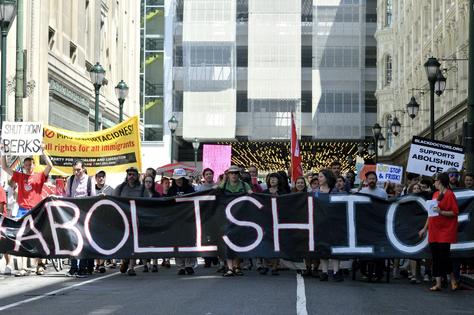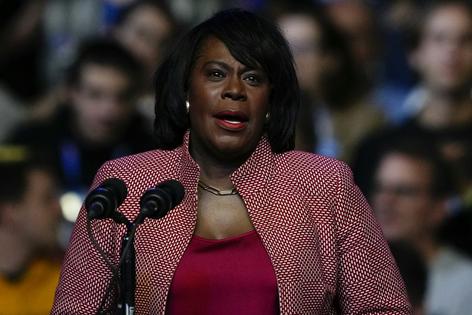Yes, Philadelphia is a sanctuary city − but that offers undocumented immigrants little protection from mass deportations
Published in Political News
Philadelphia is what’s known as a sanctuary city. While the term has no fixed definition, it usually refers to a city that has declared its refusal to cooperate – or even works at odds – with federal immigration enforcement.
Will living in a sanctuary city safeguard Philly’s roughly 50,000 undocumented immigrants and their families if President-elect Donald Trump delivers on his promise to deport a record number of immigrants?
As a law professor at Temple University in Philadelphia, where I supervise students who represent low-wage immigrant workers in the city, including on issues of immigration enforcement, I know that sanctuary policies are meaningful in that they throw a wrench into the federal immigration enforcement system.
But the bottom line is that federal immigration officers – usually U.S. Immigration and Customs Enforcement – can still carry out deportations in a sanctuary city. Living in a sanctuary city such as Philadelphia does not mean that city residents are otherwise safe from ICE.
Through my work at the Sheller Center for Social Justice at Temple Law School, I have researched sanctuary policies as well as how often ICE relies on local law enforcement to help identify and turn over immigrants.
Philadelphia’s various sanctuary policies, which I’ll describe below, break that connection and leave ICE to its own devices. They also signal to immigrants that the city is not in the business of federal immigration enforcement. This is significant for immigrant communities, as it means they should feel safe to access public benefits and services such as getting care at a community health center or calling the police without fear of immigration consequences.
Philadelphia’s most notable sanctuary policy, an executive order signed by then-Mayor Jim Kenney in January 2016, is its refusal to have its jails honor ICE detainers or requests for release dates. An ICE detainer is a voluntary request asking local officials to hold an immigrant, who is otherwise going to be released, for an additional 48 hours so ICE can pick them up. Failing to honor ICE detainers disrupts the deportation pipeline and makes ICE’s job more difficult.
Another key Philadelphia sanctuary policy dates back to 2009 and was signed by then-mayor Michael Nutter. It makes clear that city officials do not police immigration. Not only are all city workers – including police, firefighters and behavioral health workers – prohibited from asking about immigration status in most situations, but police are specifically directed not to stop, arrest or detain a person “solely because of perceived immigration status.”
Yet there is no way to enforce these sanctuary policies. Under these laws, city officials who violate them do not face consequences. Compliance relies on a commitment from officials who believe that following these policies is the right thing to do.
Philadelphia has also acted in other ways to break the link between the city and immigration enforcement.
As of 2017, Philadelphia jails have had a protocol that discourages ICE from interviewing immigrants held in jail. Prior to providing ICE with access to such individuals, the jails must first send a consent form to an immigrant to inform them of their right to decline an ICE interview.
In 2018, Philadelphia ended ICE’s access to the city’s Preliminary Arraignment Reporting System, or PARS records database, used by the Philadelphia Police Department and district attorney’s office. The city said it terminated its database-sharing contract with ICE given the “unacceptable” way the agency used the system, which “could result in immigration enforcement action against Philadelphians who haven’t been arrested, accused of, or convicted of any crime.”
Apart from the city itself, other public and private institutions within Philadelphia have created sanctuary spaces.
The University of Pennsylvania, for example, declared itself a sanctuary campus in November 2016, stating that the university would refuse to allow ICE entry onto Penn grounds without a warrant.
In June 2021, the School Board of Philadelphia adopted a sanctuary resolution as part of an effort to create welcoming schools for immigrant children.
Meanwhile, religious institutions, such as the Germantown Mennonite Church in Northwest Philly and the Tabernacle United Church in West Philly, have provided sanctuary inside their churches to immigrants who have received final orders of deportation from ICE.
Since 2011, ICE has had a “sensitive locations” memo that disfavors, but does not entirely prohibit, immigration enforcement in places of worship, as well as hospitals and schools. The Biden administration strengthened the “sensitive locations” memo in 2021. Trump reportedly intends to rescind the policy, as soon as his first day in office.
From the viewpoint of the incoming Trump administration, sanctuary cities harbor “dangerous immigrants.”
Despite an abundance of strong rhetoric, data shows that less than 6% of deportation cases brought under the previous Trump administration from 2017 to 2019 were based on criminal grounds.
Nonetheless, the incoming administration has vowed to punish sanctuary cities by cutting their federal funding, particularly funds earmarked for local law enforcement.
Past instances of retaliation, however, failed. The first Trump administration was unsuccessful at terminating a US$1 million federal grant to Philadelphia after the city sued and won in federal court.
During the campaign, Trump proposed getting Congress to ban sanctuary cities. This effort will similarly be mired in legal challenges. Cities, like states, have constitutional protections against being forced to administer or enforce federal programs.
Yet retaliation attempts against sanctuary cities by the federal government seem likely. Philadelphia City Council member Rue Landau has been outspoken about maintaining the city’s sanctuary status to ensure that public resources will never be used to support federal deportation efforts. But Mayor Cherelle Parker has not committed to strengthening or even ensuring the city’s sanctuary protections.
While sanctuary policies do not prevent undocumented immigrants from being deported, they do represent cities exercising the right to define their community and promote a sense of belonging in direct resistance to federal policies.
This article is republished from The Conversation, a nonprofit, independent news organization bringing you facts and trustworthy analysis to help you make sense of our complex world. It was written by: Jennifer J. Lee, Temple University
Read more:
Trump wants to use the Alien Enemies Act to deport immigrants – but the 18th-century law has been invoked only during times of war
LGTBQIA+ sanctuary declarations help cities take a stand to defend rights – but may not have much actual legal impact
Immigrant moms feel unsafe and unheard when seeking pregnancy care – here’s how they’d improve Philly’s health care system
I work with immigrant rights organizations that work on issues of ICE enforcement through my legal clinic class.
































































Comments